Scores Die In Iran Road Accidents As New Year Travel Begins
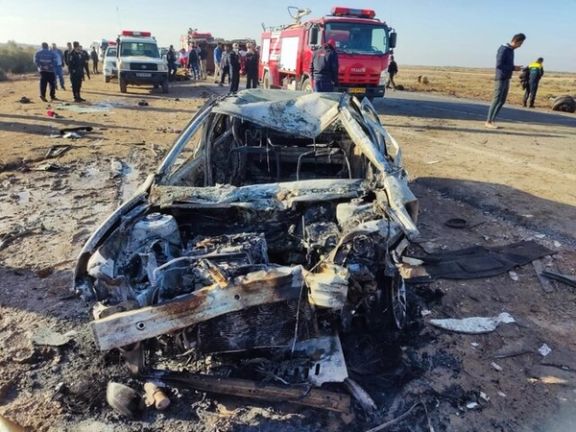
With the Iranian New Year, or Nowruz, holidays not yet started, at least 107 people have died in road accidents as traffic increases.

With the Iranian New Year, or Nowruz, holidays not yet started, at least 107 people have died in road accidents as traffic increases.
Announcing the figures on Saturday, the deputy head of Iran’s traffic police Teymour Hosseini said more people were taking intercity trips for Nowruz, which begins Sunday. Most of the accidents had occurred in Fars, Bushehr, Sistan-Baluchestan, and Yazd provinces, but Hosseini said traffic had increased everywhere, especially on roads to northern provinces near the Caspian.
As in many countries, restrictions on movement in place for the Covid-19 pandemic have been eased despite the continuing struggle with the Omicron variant: 782 have died in Iran in the past week, around the same as the United Kingdom but down from Iran’s peak of 4,444 in August.
Iran has a poor road safety record with annual fatalities around 20,000, although it is not in the top 50 globally according to World Health Organization reports for traffic fatalities per head of population. The fatality rate is lower than Saudi Arabia. Lebanon, Kyrgyzstan and Yemen, but higher than Iraq, Armenia, and the United Arab Emirates.
The toll is variously blamed on speed, poor quality of roads, lax inspection of vehicles, disregard for traffic laws, and inadequate emergency services. A 2017 report by Iran’s traffic police said that nearly 280,000 had been killed and more than 4 million injured in road accidents since 1998.
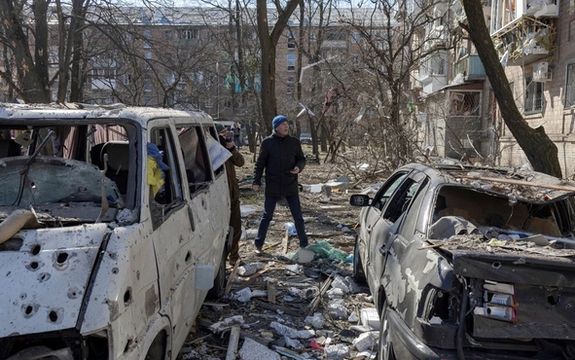
A Former senior Iranian lawmaker has said that the crisis in Ukraine provides a golden opportunity for Iran to get a foothold in international energy markets.
Heshmatollah Falahatpisheh who was the chairman of the Iranian Parliament's National Security and Foreign Policy Committee added that although Russia pretended to be protecting Iran in some of the challenges Tehran faced, but Moscow has taken away Iran's opportunity for cooperation with Europe.
He was referring to the history of Tehran-Moscow ties since 2003 when Iran was engaged in nuclear talks with Europe. Falahatpisheh claimed that during this period, the Russians prevented Iran from cooperation with Europe in the areas of energy and establishing gas pipelines to Europe.
In an interview with Etemad Online published on Friday, the conservative politician said that the world is now confronting Russia and Iran should seize this opportunity to reclaim a stronger position in the energy market. This has been consistent with other remarks the senior politician has made recently, calling for direct talks with the United States.
On the issue of Ukraine, Falahatpisheh argued that the West may have to retreat to an extent: "One of the solutions to the problem is that the West including the United States should accept Russia's demand for stopping the eastbound expansion of NATO. Doing so, will, of course, be a defeat for NATO's Partnership for Peace (PfP) program."
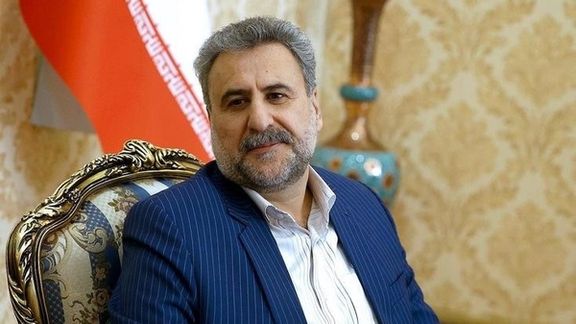
Falahatpisheh explained that the PfP, which was formed in 1994, is a program of practical bilateral cooperation between individual Euro-Atlantic partner countries and NATO, which allows partners to build up an individual relationship with NATO, choosing their own priorities for cooperation. Based on this program NATO shifted from its defensive nature to an offensive position, Falahatpisheh said.
He said that Russia in the meantime used international economic dynamics to establish its position as the world's energy highway. He added that that Russia in this period “robbed Iran of opportunities to cooperate with Europe” in supplying energy adding that Moscwow followed the same policy toward Iran's other economic activities.
Falahatpisheh observed that while Iran has the world's second largest natural gas reserves, it holds only one percent of international gas trade. He added that the world is now thirsty for natural gas and Iran should gain markets around the world instead of allowing Russia to waste its time.
Stressing that "Russia's opportunism took advantage of Iran's challenges with the West, it is now time for Iran to seize the opportunity of the war in Ukraine, solve its problems with the West and regain its position in the global energy market."
Meanwhile, Iran’s Friday Prayer Imams, receiving central guidance for their Friday sermons, continued to use Ukraine’s invasion to bash the United States and claim the West has abandoned the Ukrainians.
Qazvin’s Imam Abdolkarim Abedini using the occasion to unleash an attack on the US said that Washington has abandoned its own “vassal”, the president of Ukraine, “the same way it abandoned, the Shah, Ashraf Ghani of Afghanistan and Saddam Hussein.” He added that Americans want to disarm Iran the same way they took away Ukraine’s nuclear weapons (in 1990s).
Others repeated the official government line that the US is responsible for provoking the war, not even mentioning Russia.
The only minor exception was a sentence uttered by Mohammad Hossein Aboutorabi Fard who led Tehran's Friday prayers on March 18. He said: "We are sorry for the people of Ukraine, and we never welcome war and invasion."
However, Aboutorabi called the wave of international sympathy “shedding alligator tears for Ukraine.”
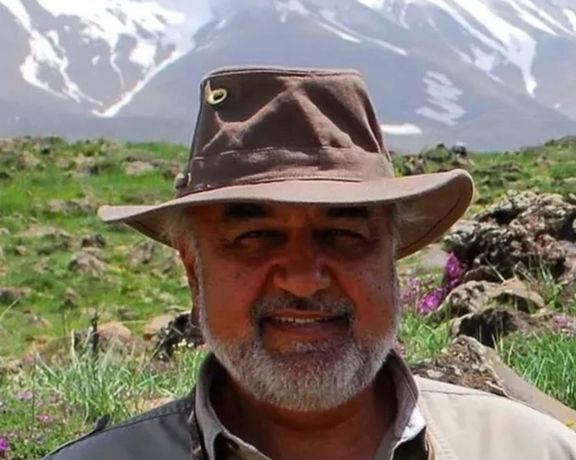
The US said Friday anything short of an immediate furlough of a dual citizen taken back to an Iranian prison, would be a violation of Tehran's commitments to the United Kingdom.
In a deal earlier this week that freed two British Iranian detainees, Tehran promised also to furlough environmentalist Morad Tahbaz, who holds both British and American citizenship.
Tahbaz's sister, Taraneh Tahbaz, in an interview with Reuters said her brother had been taken back to prison on Friday after being released on furlough on Wednesday.
Shortly afterwards, a spokesman for Britain's foreign ministry said it had been told by Iran that Tahbaz, 66, had been taken back to Evin prison “to fit an ankle bracelet” and that the British government hoped he would be allowed out in coming hours.
A State Department spokesperson, speaking on condition of anonymity, noted that Iran made a commitment to the United Kingdom to furlough Tahbaz.
"We are not a party to this arrangement but would join the UK in considering anything short of Morad’s immediate furlough a violation of Iran’s commitment. We are urgently consulting with the UK on appropriate responses," the spokesperson said.
"We continue to work night and day to secure the release of our wrongfully detained citizens, including US-UK citizen Morad Tahbaz," the spokesperson said.
Tahbaz was arrested in 2018 and sentenced to 10 years in prison for "assembly and collusion against Iran's national security" and working for the United States as a spy.
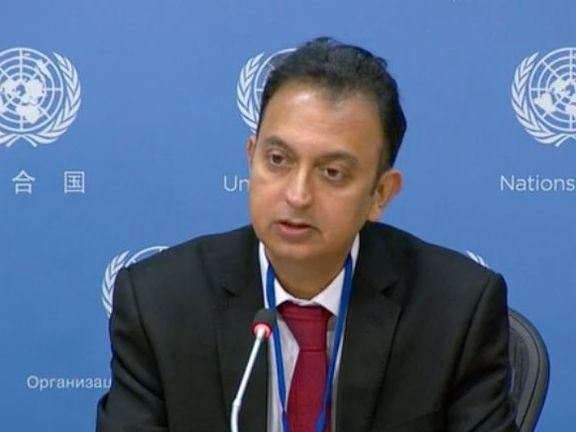
Iran's foreign ministry on Friday accused the UN Human Rights rapporteur of 'politicizing' the situation of human rights in Iran and issuing biased reports.
In a statement, ministry spokesman Saeed Khatibzadeh said the latest report of UN special rapporteur Javaid Rehman on the situation of human rights in Iran to the UN Human Rights Council was "full of one-sided and incorrect information and conclusions" and contained allegations based on misinformation received from "hostile sources".
In the report Rehman highlighted the situation of American, British, French, German, Austrian, and Swedish prisoners in Iran, several of whom were convicted by Revolutionary Courts on vague security charges after trials that did not meet international standards of due process.
The accused in such cases often cannot choose their defense attorneys. Trials take place behind closed doors, and duration of detentions before trial are arbitrary. International human rights organizations have documented numerous instances of violations.
Iran released two British-Iranian detainees on Wednesday after the payment of an old $530 debt to Iran but Iran's foreign minister, Hossein Amir-Abdollahian denied there was any connection between the payment and the release of the two detainees who spent several years in prison on charges of spying.
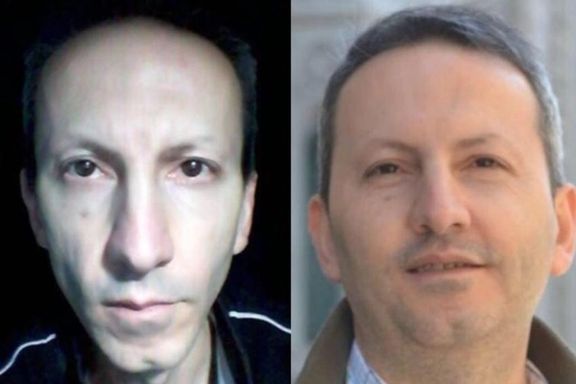
International organizations such as Human Rights Watch (HRW) and the UN Working Group on Arbitrary Detention have for years said Iran's security forces were targeting Iranian dual citizens and foreign nationals, charging them with cooperating with "hostile' states without revealing any evidence, and sentencing them after trials that violated their right to due process.”
According to Rehman's report, in 2021 Iran executed at least 280 individuals, including at least 10 women and three juvenile offenders who were convicted of crimes committed before they reached the age of 18.
Rehman, a professor at Brunel University, has not visited Iran since he was appointed in 2018, because Iran has banned UN and other human rights investigators from visiting the country.
“We condemn the application of double standards by Western countries and the instrumental use of the concept of human rights as well as the silence and inaction of countries that claim to be advocates of these rights” in the face of human rights violations by certain countries, Iran's President Ebrahim Raisi said Monday.
After Saudi Arabia’s execution of 81 prisoners in the largest mass execution by the kingdom in modern history over “terror-related offenses", Kazem Gharibabadi, the secretary of Iran’s High Council for Human Rights, also criticized Western countries for using human rights to put pressure on non-aligned countries but not their allies such as Saudi Arabia.
As in his previous quarterly reports, in his latest report to the forty-ninth session of the UN Human Rights Council Rehman urged Iran to immediately abolish the death penalty for all offences through legislation.
Pending abolition, he urged the authorities to impose an immediate moratorium on executions and commute all death sentences, amend legislation to prohibit the execution of persons who committed a crime while under the age of 18 years and for offences that do not amount to the most serious crimes under international human rights law.
He also urged protection of prisoners and detainees from all forms of torture and other cruel, inhuman, or degrading treatment or punishment and ensuring that confessions are not obtained through torture or ill-treatment, revise legislation to eliminate child marriage, and improve conditions in prisons.
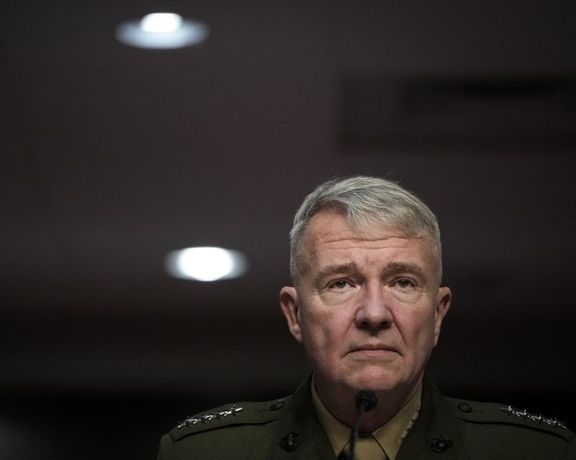
The outgoing US CENTCOM chief has slammed delays in weapons sales to allies in the Persian Gulf, calling for more US commitment to counter the Iranian threat.
General Kenneth McKenzie told a House Armed Services Committee Hearing on Middle East Security Challenges on Thursday that reducing the number of American troops and capabilities in the region contributed to the perceptionof a “wavering United States commitment to the security and stability”.
“The greatest single day-to-day threat to regional security and stability remains Iran, which challenges the US and its allies by pursuing regional hegemony, breaching its Joint Comprehensive Plan of Action (JCPOA) commitments, and posing a conventional threat to partner nations while facilitating and conducting coercive and malign activities”, he said.
McKenzie added, “Deterring Iran and its threat network depends on capabilities that provide a credible threat of a robust and timely response to Iranian aggression paired with flexible deterrent and response options that impose high costs on Iran, thereby altering its decision calculus.”
Describing the Houthis as the “least restrained and most destabilizing of all of Iran’s affiliates in the region”, McKenzie said they can escalate the crisis in the region “using whatever means the Iranians put at their disposal, even at the risk of inflicting mass civilian casualties and threatening American forces.”
He said, “Iranian-aligned militia groups are likely to continue sectarian criminal, and anti-US activities that destabilize Iraq.”
“Iran will continue to use Syrian (and likely Iraqi) territory as a critical hub and resupply route for maintaining its campaign against Israel”, McKenzie added.
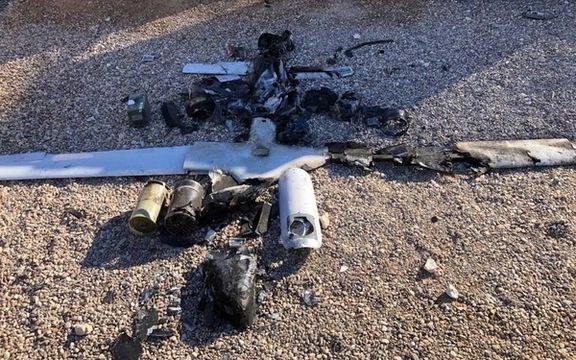
The Iraqi Security Media Cell said Thursday that four Katyusha rockets had struck Iraq’s largest military airbase 90km north of Baghdad in Salahuddin province.
Colonel Mohammed al-Bazi of the provincial police said the attack on Balad had caused no casualties but that three of the rockets had hit one of the base’s buildings, leaving minor damage, while the fourth landed in an open area. The base hosts Iraqi F-16 jets, while United States security contactors have reportedly left what was once the major hub for in-coming US munitions.
The Iraqi Security Media Cell, which calls itself a counter to the propaganda of Daesh, the Islamic state group, claimed the rockets were launched from Khalis district, some 20-25km away, in neighboring Diyala province.
The cell blamed this “cowardly terrorist act” on “gangs that do not want stability for Iraq” who it said would be “put behind bars…under the judgment of the law.”
No group has claimed responsibility. The Kurdish news agency Rudaw notedthat “similar attacks on international targets in Iraq are blamed on Iran-backed Iraqi militias who want to force American forces to withdraw from the country.” Rudaw said such attacks “increased after the US assassinated Iranian General Qasem Soleimani and Iraqi militia commander Abu Mahdi al-Muhandis in Baghdad in January 2020.”
On Sunday, Iran fired 12 ballistic missiles at Erbil, northern Iraq, after an Israeli airstrike in Syria killed two Iranian soldiers. A villa, Iran alleged was used by Israeli intelligence, was damaged but there were no casualties.